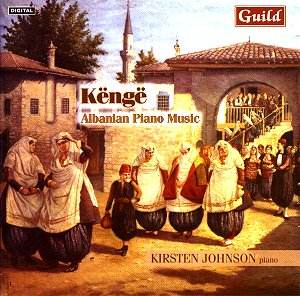Këngë is the Albanian for 'song'.
This gives the clue to this selection of pleasing folk-accented solo
piano pieces. Dissonance plays only a bit part here and there. Otherwise
the emphasis is on 'singing' melodic material sometimes with a subtle
Middle Eastern flavour. Before we become too superior about these products
of Enver Hoxha's regime (1944-1985) we should reflect on the strengths
of E.J. Moeran's solo piano music (well taken by Una Hunt on ASV), Peter
Maxwell Davies' Farewell to Stromness, Ronald Stevenson's folk
pieces, the piano music of Lionel Sainsbury, the phenomenal success
of Gurdjieff and de Hartmann and of Alan Hovhaness. These Albanian pieces
were written under an oppressive regime that forbade the study of music
written after the deaths of Stalin and Prokofiev (1953). Confinement
to folk roots must not condemn this always attractive and rarely anodyne
material.
Ibrahimi's Tokatë (1963) and Avrai's Tokkata
(1979) are whirling Dervish dances dusted with Bartókian dissonance
- more in the Ibrahimi than in the Avrazi. Dissonance is banished for
Lara's gently rocking Këngë (rather Nyman-like I thought)
and a delightful folksy Pastoral with that Eastern tang. It is
no surprise that Kenge comes from a suite called Joyful Days.
The Lara pieces are from the 1970s. Vorpsi's hypnotic Variations
on a Popular Theme (1978) is based on the folksong Why does the
blackbird sing? It is cut from the same cloth as the Lara pieces.
Nina-Nana, a gentle lullaby, again with that exotic eastern flavour
(a touch of Borodin), is by J. Papdhimitri. The glinting and smiling
Children's Dance is by A Komino. Alberto Paparisto's three pieces
are by turns motoric (Çiftelia is a chicane ride evocative
of the folk instrument of the same name), dissonantly reflective and
sardonic (the seas of Prokofiev being plied in Humoreska). Gjoni's
Song of Bravery is not your standard fare - nothing of the stand
and bawl about this. Instead we get a noble, sometimes slightly dissonant
and fiercely declamatory hymn-cortège using the apparatus provided
by the Liszt piano sonata. The Dies Irae is woven into this music.
Sokoli's Nocturne has a quiet Beethovenian air about it - rising
from lament toward indomitable major key optimism. Zadeja's Four
Pieces from the 1980s are subdued (tr.15), Shostakovich-like in
places (tr.16), starry in the manner of Sisask (tr.17), idyllic and
quietly nervous. Harapi's tranquil, folk-like and Chopin-spirited Romance,
Valle, Nji Dhimb, Moll'e Kuqe and Romanze
contrast with the spirited toccata-like allegro vivo (tr. 22)
and the nostalgic Waltz on a Popular Theme. These Harapi pieces
are from the period 1966 to 1987. They recall the sincere pastiche piano
solos of Valentin Silvestrov and the Schumann inflections of the Swiss
composer Richard Flury.
Without denying its individuality this music will appeal
to you if you have already discovered and remained loyal to the Gurdjieff/Hartmann
series on Auvidis Naive or the Hovhaness piano discs on Koch.
This folk-exotica is sympathetically played by Kirsten
Johnson who also wrote the excellent notes. I wonder if she is planning
a second Albanian volume. If not perhaps she and Guild might consider
doing the same for the piano music of Bulgaria and Rumania.
This disc has the potential to become extremely popular.
I hope that the likes of Classic FM in the UK will do more than take
note of it.
Rob Barnett


